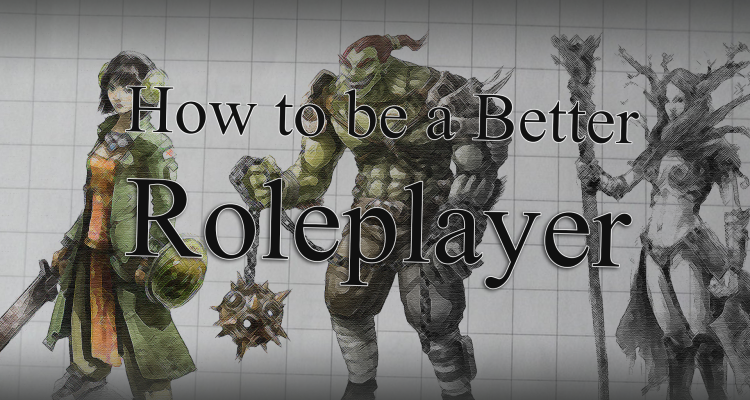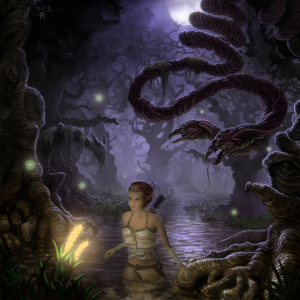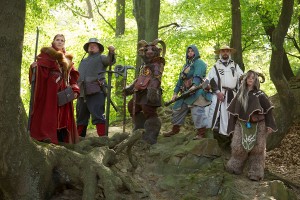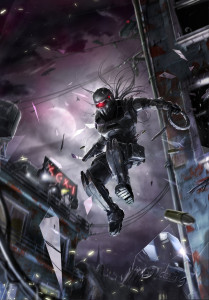A Player’s Guide to Building on the Flow
Recently at Nerd Sourced, we released a series on DM fundamentals for 5th edition, but this only focuses on one person at the table: the GM.
So what about the players? I mean let’s face it, for every one GM there are at least three or four other people at the table. Somehow, though, no one seems to be talking about techniques to help the players get better at their job.
So, listen up, player! The days of complete GM responsibility are over. Here are some tips to help you become a better role player, and to make the session more fun for everyone at the table.
Character Creation Philosophy
Before you play, you need to make the right character for you and the rest of the group. Think about these questions before you crunch all dem’ numbers (if you need help crunching dem’ numbers, check out our easy character creation guide for D&D 5th edition).
1. What kind of role player are you?
If you’ve never played before, you’re probably thinking “I have no idea!” Not a problem. An easy way to figure this out is to think about what you hope to get out of the experience. Let’s take a look at some of the archetypal ways people enjoy role playing games.
Performing: This is about acting in character. Players who like this aspect of the game will usually come up with a unique character voice automatically, and will be the first to step forward during dialogue sequences. Being at the center of attention, or the leader of the group, is what these players strive for. They tend to not be compelled by long deliberations about numbers or game mechanics.
Thinking: Careful planning and deliberation is what this style is about. Thinkers usually prefer to carefully watch events from afar before adding their two cents. Creative problem solving is where they shine. Environmental puzzles, plot dilemmas, and tactical battle spaces are what they play for.

Image by lilgamerboy14
Fighting: Sometimes nothing is more satisfying than cracking some heads and flexing all that power you’ve earned over the course of the game. These players usually like the mechanical aspects of battle, and get a thrill out of unleashing powerful abilities on enemies. If too much time passes without someone’s ass being kicked, they often get restless.
Collecting: This is about getting things like items, levels, and abilities. Players who like collecting are often the treasure hunters in the group, and get a lot of enjoyment out of becoming steadily more powerful as the game goes on.
Most people have a bit of each of these archetypes in them. Decide which ones stand out to you the most, and strive to create a character that focuses on those aspects.
2. How does your character fit the story?
It pays to approach role playing from a utilitarian perspective. Think of it as being part of an ensemble cast for an epic movie. Your character has a very important supporting role but she’s not the star. No one is. What’s best for the group as a whole is most important. You need to figure out how your character will fit in with the team, and what makes sense for the world the GM has created.
Talk to your GM. Talk to your fellow players. Make decisions that gel well with the group and the world. A pacifist cleric can be an interesting character but not if you constantly try to stop other players from engaging in combat. Be unique, just do it in a way that helps the team rather than pissing them off or slowing things down.
ROLEPLAYING
Now for the meat and potatoes. The keys to successful role playing are very similar to those of improv performance. That’s what role playing is, essentially. You get a role, then you improvise a story using that role. Many of the following ideas are inspired by improv techniques.
Build on the Flow
Hey! That’s in the title! You’re damn right it is. That’s because it’s hands down the single most important piece of advice I want to convey to you in this article. Be proactive. Stop planning so much. Don’t be afraid to make a mistake. Mistakes are interesting. Some of the most fun role playing moments can come from trying to survive the wonderfully sticky situations that mistakes provide.
Find out what your character is good at, and think of ways to apply that to each situation you encounter. This will be vastly different from character to character. You must constantly think about what your character can contribute to each scene, then do it.
The worst thing a player can do is be passive. No, scratch that, the worst thing a player can do is try to stop things from happening. That equals death for the story. Don’t stop the game to have a meta-conversation about why it’s a bad idea for the dwarf wearing full plate to jump overboard to save a drowning man. Instead, watch him jump, then jump in after him. Or throw him a rope and try to pull him up. Or cast a spell on him so he can breath underwater. Bingo, the situation is now more interesting. Would it really have been more fun if you had all just stayed in the boat and done nothing?
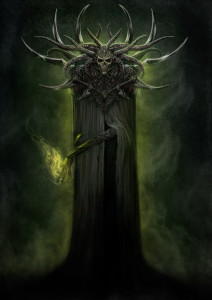
Image by Elder-Of-The-Earth
At any given moment, you need to accept everything that happens, then react. Your reaction should build upon the flow of the game and make it more interesting. In improv they call this the “yes and” technique. Here is a mathematical example:
1 – 1 = 0
This is what happens when you stop the flow.
1 + 0 = 1
This is what happens when you go with the flow.
1 + 1 = 2
This is what happens when you build on the flow.
So ask yourself: How many interesting things do I want to see happening in this moment? “As many as possible!” That’s the right answer.
Know the Difference Between You and Your Character
Hopefully this has become obvious by now, but it bears repeating: You are not yourself when role playing. You are playing a role. Surprisingly, this can be quite difficult for many new players to grasp at first.
You have to start thinking about how your character would do things, rather than how you would do things. For this to work, it’s key that you understand exactly how you and your character differ. Think about your character’s moral alignment, age, gender, upbringing, beliefs, and personality. If at least two or three of these aren’t completely different from your real self, then it’s back to the drawing board.
Create a voice
Tabletop RPGs are all about talking. In fact, pretty much the entire game is handled verbally. Unlike improv, no one gets out of their chair and starts acting things out. So your verbal communication is even more important here. Having a special voice will instantly help you start thinking as your character rather than as yourself. Like I said earlier, new players often have trouble with this. A voice is one of the easiest ways to solve the problem. No one said it has to be an oscar worthy performance, in fact most of the time voices are just going to sound silly. That’s great! Silly voices are entertaining. Truly, anything is better than your normal voice.
Think Outside the Box
A huge part of role playing is problem solving. How do we sneak past the guard, get through the locked door, and escape with the enormous treasure chest without dying? Be creative! Remember, you are all trying to tell a story together. So tell an interesting one in which the characters do unexpected and unique things. If you can’t think of anything, consider all the tools at your disposal:
- Your equipment
- Your spells and abilities
- Your skills (especially the ones you are good at)
- Environmental clues provided by the GM
- Your character’s unique style
Do something that is both unexpected and characterful.
- You want to assassinate the queen? – Don’t just sneak in through the window. Make a disguise that looks just like her and try to bluff your way right through the front door!
- Surrounded by guards? – Try to convince them there’s a traitor in their midst.
- Planning an ambush? – Have the wizard use Ghost Sound as a distraction first.
- Someone robbing you? – Convince them your gold is covered in basilisk venom and only you yourself can handle it with gloves.
- Being attacked by gryphon riders on your way up the canyon? – Don’t just kill them. Hijack a gryphon and fly the rest of the way.
What Not To Do
Be a Rules Lawyer
The number one unwritten “rule” of any role playing game is to have fun. If people are having fun, who gives a dire rat’s ass if the rules aren’t always held to the letter? Of course you don’t want things to get out of control, but a few breaks here and there are fine. In fact, most games are house-ruled in some aspect anyway. Just remember that the GM’s authority transcends any written rules. The rules are like the laws of physics, but the GM is like god. God can break whatever rules he wants. He is omnipotent.
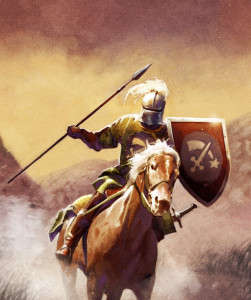
Image by tikos
Try To Regulate Other Player’s Actions
This is self explanatory. It comes from the “build on the flow” section. Don’t stop things from happening and don’t ever ever ever tell someone else how to play their character.
Only Pay Attention When Its Your Turn
This is just rude. Many times players will wait until it’s their turn before even looking at the board or trying to come up with a plan for themselves. When it isn’t your turn you should be planning your next turn. That way, when it’s you turn you can just execute your plan and no one has to wait. Everything goes faster, more gets done, and the session is more eventful. Only playing when it’s your turn is self indulgent and it hurts the group.
So remember players:
- Make a character that plays to your particular strengths and fits with both the GM’s world and the rest of the group.
- Build on the flow of the game with unexpected yet characterful actions that react to each situation.
- Be considerate of the group first, before yourself, and make sure you aren’t hindering progress.
We want to know what you think: What aspect of the game did you struggle with the most when first starting? What advice have you learned in your travels that I may have missed here? Let us know in the comments!

